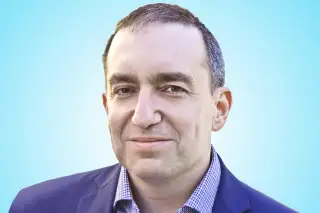5 Ways to Make Smarter Investing Decisions—By Outsmarting Yourself

The best thing you can do for your portfolio may be absolutely nothing.
A steady, mechanical approach to investing is a predominant theme throughout Heads I Win, Tails I Win, a new book released today by Wall Street Journal "Heard on the Street" writer and editor Spencer Jakab. The former Credit Suisse stock analyst emphasizes that the vast majority of investors are wired to think they're better at making money than they actually are—and that we ignore all evidence to the contrary.
The solution? "Put into place a process that will stop you from sabotaging yourself," Jakab recommended when we spoke to him this week. That means investing in a methodical—and even mechanical—way, rather than reacting to the ups and downs of the market and pundits predicting gloom and doom on TV.
Here are five more guidelines that Jakab says can help you outsmart yourself and, ultimately, generate better investing returns:
1. Acknowledge your shortcomings.
Self-deception isn't all bad: It enhances our self-esteem and even our happiness. But it can be deadly when it comes to investing—and studies show that people tend to grossly overestimate their investing acumen. Jakab points to a survey by some German finance professors in which investors estimated that they made nearly 15% a year over four years, when in fact they'd netted only 3.7% (and only 20% of them had kept pace with the market as a whole).
Instead, accept the fact that you're prone to errors when making quick decisions on your own. Focus on a steady strategy of investing and rebalance your portfolio once or twice a year at predetermined times. By avoiding the temptation to react impulsively during bad times, you'll avoid damaging mistakes and capture extra returns by default.
2. Hire a cheap financial planner—or none at all.
Unless you're wildly impulsive or reactive, you probably don't need a financial planner, says Jakab. Statistically, a pro is unlikely to be much better than you at picking stocks. Instead, assess your level of risk and invest in appropriate, low-cost funds (perhaps drawn from the Money 50 list of best mutual funds and ETFs). But if feel you need a pro to help you develop a long-term financial plan, or to talk you out of making bad snap decisions, Jakab advises hiring one on the cheap. (Here's some guidance on finding a good adviser, and here are five red flags that should warn you away from a would-be one.)
3. Learn from your mistakes.
Jakab noted that many people who were hit hard by the dot-com crash in the early 2000s also saw their portfolio returns take a dive during the housing bubble. While the two situations were not exactly the same, these investors could have learned from the first crisis not to get caught up in explosive headlines and social panic—a lesson that might have allowed them to avoid the second.
In order to avoid making costly mistakes, decide at the outset that you will revisit your portfolio once or twice a year—and stick to your self-imposed schedule. "The world is only going to end once," Jakab says. "You have to basically just switch off your emotions."
4. Keep your ethical impulses and your investing decisions separate.
Socially or environmentally-conscious has gained popularity in recent years, a trend encouraged by financial services firms and even some academic studies suggesting that returns from socially responsible investing beat those of traditional investments.
However, in his book, Jakab points to the example of CalPERS, a California state retirement fund that in 2001 decided to sell some of its South Asian holdings because of concerns over labor practices and human rights issues at the companies. The next year, markets in Thailand, India, and Sri Lanka posted stellar returns.
It's not wrong to have ethical standards, of course, but Jakab argues against letting them play a role in your investing decisions. If your moral compass is bothering you, he suggests, keep in mind that owning a few shares of a public company won't impact its practices one way or another. You're buying shares from another investor in the secondary market for those shares, not handing the company new money to fund operations.
5. Don't rush to get in on that hot new deal.
Jakab cites plenty of examples of stocks that were supposedly deals you could not miss out on—like video game company Zynga, the creator of Mafia Wars and FarmVille, which ultimately lost 75% of its value within three years of going public. In fact, the odds of striking it rich by getting in early on the next Google or Facebook are staggeringly low. And as my Money colleague Paul Lim wrote last year,
"The fact is, unless you gain access to an IPO at a great price at issuance, you can’t view those stocks as buy-and-hold investments. And you should avoid any richly priced new stock altogether."